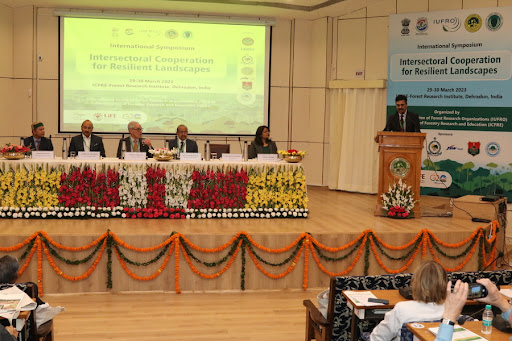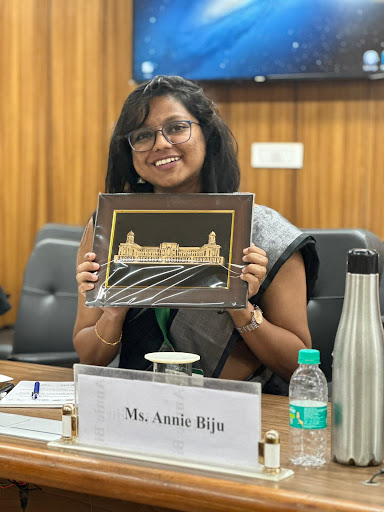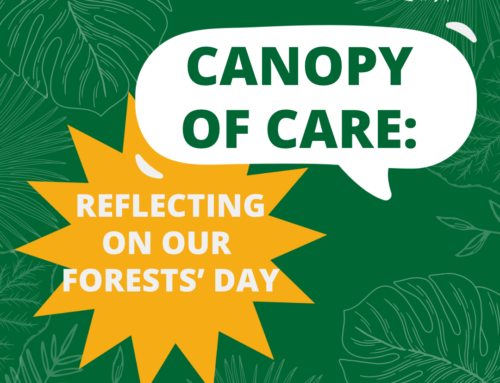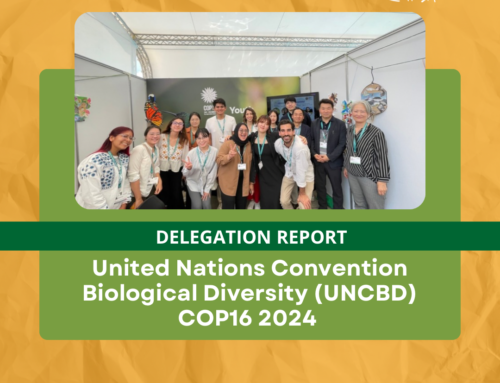Efforts in Mainstreaming Landscape Restoration Education Into The Current Education Systems in South – East Asia
A Lesson Learned From IUFRO – ICFRE Symposium

Opening Speech during the symposium
International Symposium on Intersectoral Cooperation for Resilient Landscapes organized by IUFRO and ICFRE – Indian Council of Forestry Research and Education in Forest Research Institute, Dehradun India on 29 and 30 March, 2023 discussed innovative approaches for landscape restoration, issues related to governance and policy, and perspectives of different stakeholders associated with landscape restoration. The two day event was enriching as we gained phenomenal knowledge first hand from people involved in ecological restoration and working on ground in building climate resilient forests and landscape. The event helped to bring together different stakeholders and forestry students under one roof and deliberate the importance of integrated/cross-sectoral approach for creating sustainable solutions to the problems associated with restoration.

Annie Biju, IUFRO-IFSA Joint Task Force on Forest Education Coordinator as a panelist at the session ‘Integrated / cross-sectoral education and training
I had the incredible opportunity as IFSA representative to be part of the panel discussion on “Integrated/Cross-sectoral Education and Training” which explored the importance of education for enhancing capacity development and increasing the number of qualified personnel working on Landscape Restoration. The session had Dr. Michael Kleine as the moderator, two keynote speakers – Mr. Bharat Jyoti from India and Dr. Steve Makungwa from Malawi speaking from their experiences. Mr. Bharat Jyoti elaborated on having “optimal to suboptimal solutions keeping in mind the realistic complexities and feasibility of restoration” for a resilient landscape. While Dr. Steve shared his experience on promoting landscape thinking in natural resource education – a case of Malawi. The panel had rich diversity in terms of gender and stakeholder representation and included Dr. Cora van Oosten, Wageningen University and Research/Global Landscape Forum, Prof. Thilanka Gunaratne, University of Peradeniya and myself representing IFSA – International Forestry Students’ Association and JTF – IUFRO-IFSA Joint Task Force on Forest Education. The discussion was really stimulating as we discussed the way forward to a future with climate resilient landscapes.
The session highlighted the efforts of mainstreaming Landscape Restoration education into the current education systems in South – East Asia that are in progress and the need to explore ways to enhance interdisciplinary and cross-sectoral natural resources education to meet the increasing necessity of trained professionals competent to contribute to future resilient landscapes. It was a unique occasion for me as I got to assimilate knowledge from experts presently working in the field of landscape restoration and also to provide small insights as a student as well as JTF Coordinator to the panel discussion.
Summing up the general expression
Educating young forestry graduates and professionals in Forest Landscape Resilience is of utmost importance so as to increase the number of competent personnel in the field to achieve the goals set for UN Decade of Ecosystem Restoration 2030. Solutions to land degradation, climate change and restoration efforts of forests are multifold, cross-sectoral and require assistance from all the stakeholders for success. Mainstreaming education towards Intersectoral Cooperation will help to achieve sustainable, climate resilient landscapes around the world.
By Annie Biju, Deputy Coordinator of Joint IFSA – IUFRO Task Force on Forestry Education



